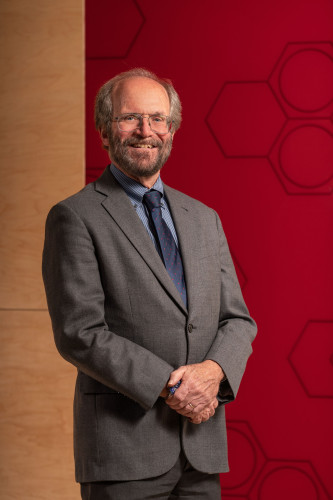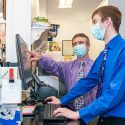Golden to step down as dean of School of Medicine and Public Health
Robert N. Golden, who has served as dean of the University of Wisconsin School of Medicine and Public Health (SMPH) since 2006, announced today that he will be stepping down as dean and vice chancellor for medical affairs once a successor is in place.
As one of the longest-serving medical school deans in North America, Golden has led extraordinary advancements in the educational, research and service missions of the school.
“It has been an incredible honor and privilege to serve as dean and as the university’s vice chancellor for medical affairs,” Golden says. “As I look forward to the next phase of my professional life, I cherish the experience of working with so many remarkably talented and dedicated individuals within our school and our academic health system on behalf of those we serve.”

Robert Golden
Fostering collaboration throughout the academic medical center for the benefit of the public has been a hallmark of Golden’s leadership. These efforts have ranged from integrating disciplines to laying foundations for new educational and research programs across the state and breaking ground – in a literal sense – for new facilities.
“We are deeply indebted to Dean Golden for his many incredible years of service to our students and for all of his leadership in service to the health of our state’s residents,” says University of Wisconsin–Madison Chancellor Jennifer Mnookin. “His tireless dedication embodies the Wisconsin Idea and innovation for the public good. He has worked hard across almost two decades to strengthen health care in every county of Wisconsin and it shows.”
Mere months before he arrived at UW–Madison, the school changed its name to integrate the fields of medicine and public health. Golden oversaw the efforts to shift from idea into action, fusing public health — which focuses on the science of improving the health of populations and communities — into the health care professions.
“Public health and medicine, while complementary, had traditionally been thought of as fiercely independent disciplines,” Golden says. “Through careful strategic planning, we created an integrated model that blended the strengths of the medical and public health traditions, created new synergies, and increased interactions throughout the university and with communities, local and state health agencies, and other organizations across the state.”
This ultimately led to a redesign of the Doctor of Medicine curriculum, the establishment of a residency training program in preventive medicine, and a significant expansion of the Master of Public Health degree. The MPH program, which has graduated 650 alumni since its establishment in 2005, now offers nine dual degree options to combine public health training with other fields such as medicine, law, pharmacy, nursing and public policy.
At the same time, Golden prioritized the health needs of rural Wisconsin, leading the launch in 2007 of the Wisconsin Academy for Rural Medicine, or WARM, which admits and trains medical students who intend to practice in rural areas. Of the 274 WARM graduates to date, 82 percent of those who have completed residency training are practicing in Wisconsin and 32 percent are near their hometowns; almost half are practicing in rural parts of the state.
With UW Health, the school also established the nation’s first rural-track obstetrics and gynecology residency training program and has nurtured rurally focused residency tracks in family medicine, psychiatry and surgery.
In 2008, Golden also led the launch of an urban medicine track in the MD program focused on health inequities, called Training in Urban Medicine and Public Health. Ninety-nine percent of TRIUMPH graduates have pursued their residency training in urban areas and nearly 40% have returned to urban areas of Wisconsin after completing their residencies.
Golden also prioritized and achieved gender parity among SMPH leadership during his tenure.
At the same time, as a staunch advocate for the school’s research endeavors, Golden has overseen increases in National Institutes of Health funding from $135 million in 2006 to nearly $246 million in 2022. The school has a reputation for successful interdisciplinary collaborations and its researchers are recognized as global leaders in stem cell and regenerative medicine, personalized medicine and genomics, infectious disease, asthma, Alzheimer’s disease and related dementias, social determinants of health, medical imaging and more.
The school also recently doubled its portfolio of industry-sponsored clinical trials — in less than three years — to accelerate bench-to-bedside research.
To accommodate these expanding research activities, Golden has led a more than 50 percent increase in facility space since 2006, which includes the development of the Wisconsin Institute for Medical Research, a cutting-edge translational and interdisciplinary research laboratory building on the west side of campus. Philanthropic funds were key to making this facility a reality.
Annual philanthropic fundraising has increased more than tenfold under Golden’s leadership and has also played a key role supporting research programs and scholarships. In 2022, SMPH and UW Health launched their first-ever dual campaign, “Wisconsin Medicine,” and to date it has raised more than $400 million toward a goal of $500 million.
Additionally, Golden has helped the Wisconsin Partnership Program strengthen its commitments to addressing the state’s most pressing and complex health challenges while improving the school’s connections to people and communities across Wisconsin.
Since a restructuring of the academic health system in 2015, which built a single clinical entity designed to provide optimal service to patients and populations, Golden has also served in alternating two-year terms as the chair or the vice chair of the UW Hospitals and Clinics Authority Board.
“I’m convinced that strengthening these integrated partnerships has paid dividends by fostering collaborations in many important arenas, and ultimately benefits those who matter most: patients and communities,” Golden says.
In fact, Golden’s leadership and partnership have been “foundational to our success,” says Alan Kaplan, CEO of UW Health. “Health care is a team sport, and I couldn’t have asked for a better teammate than Dean Golden. It’s the coordination of clinical care and community service with research and education that makes our academic health system so remarkable.”
Prior to taking office at UW–Madison, Golden served as vice dean of the University of North Carolina School of Medicine and former chair of the UNC Department of Psychiatry. A native of South River, New Jersey, he earned a bachelor’s degree (cum laude) from Yale University, with distinction in his major of psychology. He graduated from Boston University School of Medicine in 1979, completed his residency in psychiatry at UNC (where he was selected to serve as chief resident in 1982-83) and then completed a research fellowship in psychopharmacology at the National Institute of Mental Health.
Golden’s career in academic medicine has afforded him unique perspective on the leadership qualities that are necessary for success in complex scholarly and clinical organizations: “Leaders should be selected based on the kind of person they are, and their relevant experience. If you have to settle for one, go with the former.”
A national search for the next dean and vice chancellor will begin this spring.



